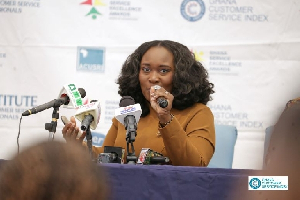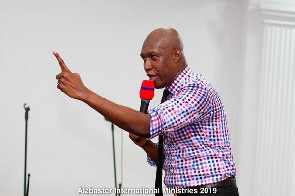Mac Sarbah, a young man from a relatively poor background in rural Ghana has defied all odds to become a graduate of Harvard, Columbia and Cambridge universities.
Sarbah shared his journey to success with GhanaWeb from growing up in the town of Yeji in the Bono East Region of Ghana where he had his first education to honing the determination of overcoming poverty through education.
He is one of eight children of his parents who grew up in the small farming community riddled with a lack of basic amenities like potable water and electricity.
Narrating his upbringing to GhanaWeb, Sarbah said the struggle to study and do his homework without electricity at times brought tears to his eyes as a result of the smoke from the kerosene lantern he used.
“My father was a disciplinarian who was feared by myself and my siblings at times but I didn’t let that bring me down. I had a lot of passion to succeed and that inspired me to work hard.
“After elementary school, I went to an obscure senior high school in rural Ghana where we walked several miles to school every day. We didn’t even have enough teachers, classrooms or books. But I was still inspired to emerge as one of a few among my cohort to pass the high school exams. It was, mostly, because of the dedication, support and mentorship of the few teachers, classmates and family,” he said in an interview by email.
During his senior high school education at a day secondary school in Adidome, also a rural area in Ghana, Sarbah said he settled for that school because his family had no money to send him to his choice.
He gained admission to the University of Ghana after excelling in his senior high school education and later gained admission to Cambridge, Columbia and Harvard Universities.
“Along the journey, I failed many times in different moments and I have been victorious as well. In both my failure and victory, I have learned great lessons which have given me the passion to serve young people, to help them overcome their education challenges, to help them achieve more, to help them fail less,” he said.
Mac Sarbah has used his experience to set up an advisory and mentorship firm called EdAcme to help young people with mentorship and guidance.
“This is what I have been doing for the past ten years. And it’s the very reason that EdAcme was born to help young people achieve their biggest goals, to help them maximize their potential, to help them be the best they can be,” he explained.
Explaining the rationale behind setting up EdAcme, Sarbah said he had been a beneficiary of good mentorship and support from his teachers, classmates, friends, school administrators, and family, hence the need to give back and serve others.
“This is why I have assembled a like-minded group of advisors from the world’s best institutions and organizations, who are passionate and committed to helping young people maximize their education, entrepreneurship and career potential. We do this by providing students and young professionals access to exclusive resources and opportunities to help them accelerate their accomplishments,” he explained.
Life before and during Harvard
Before his Harvard education, Marc Sarbah volunteered in Ghana as a middle and high school teacher in Mepe, a town where his parents were born. During his stay there, he helped raise funds for an internet facility for students in Mepe.
Prior to his arrival in the United States in 2006 to further his education, he applied and won himself the Diversity Visa lottery.
While on his stay in Harvard, he run a pro bono advisory service that has helped students from Ghana and other countries apply to universities around the world.
In May 2019, Sarbah graduated with a master’s degree in design studies from the Graduate School of Design (GSD) at Harvard University.
He then went on to start an initiative with a plan to set up an education foundation which later became a business plan for a potential fellowship focusing on entrepreneurship.
Through the program, which would be an entrepreneurial education program for Ghanaian youth, Sarbah hopes to help spark an “innovation ecosystem” for young people in Ghana.
"For me, it’s just an accumulation of a lot of things I’ve done. I want to help young people in Ghana by giving them the tools to see social problems as entrepreneurial opportunities.
"Even if they don’t end up becoming entrepreneurs there’s a belief that they would have acquired leadership skills that are very central to the job market, like communication, teamwork, and things of the sort. In a way it’s a two-pronged approach," he said.
General News of Wednesday, 9 September 2020
Source: www.ghanaweb.com













